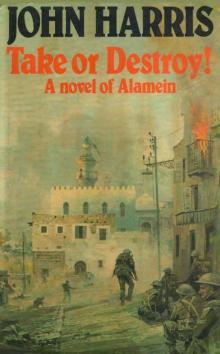- Home
- John Harris
Fox from His Lair Page 10
Fox from His Lair Read online
Page 10
Weinberger offered them mugs into which he splashed whisky from his bottle. ‘You get what you wanted, sir?’
‘No,’ Iremonger growled. ‘How about here?’
Weinberger shrugged. ‘We’ve had a helluva lot of reports on radio activity,’ he said. ‘Most of ’em from communications officers complaining about wireless operators jamming important signals. They’d been passed on to General Hardee who passed ’em back to us and said we’d better look into ’em. I guess the jamming we asked for’s affecting the wrong guys. They all say the same thing: How the hell do we get this goddam invasion on the road if we can’t send a signal?’
‘I guess it had to happen?’ Iremonger grinned.
Weinberger searched among the flimsies on the desk. ‘There’s one, though,’ he said. ‘Might be something. Came from the British Navy. A guy who was handling German messages in North Africa thought he recognised something. The message was jammed.’ Weinberger grinned. ‘So, I guess, was every other goddam message in the area.’
‘When was this?’
‘Late last night, sir. Not so long ago, in fact. If you want him, he’s at Fort Blockhouse. Which, believe it or not, is a British submarine base.’
To get to Fort Blockhouse, they almost had to fight their way into HMS Vernon, which was a shore-based establishment. No one in the Royal Navy could imagine why two army officers should want to be inside a naval base, and it took a great deal of arguing with the Regulating Branch and a cold-eyed elderly commander before they were allowed to proceed.
A sailor who looked as though he was about sixteen years old accompanied them to the King’s Stairs Landing and a boat ran them to HMS Dolphin, the submarine base at Fort Blockhouse, on a spit of land across a narrow strip of oily water. He looked far too young ever to have been to sea himself, but seemed to have imbibed the navy’s distrust of less senior services with his mother’s milk.
They climbed ashore near a jetty, alongside which lay lean grey shapes and groups of smaller boats. There were acid carboys on the quay among the ropes, and a couple of lorries waiting by a party of men struggling to lift what appeared to be a large piece of radio equipment.
A naval lieutenant was waiting for them and he saluted Iremonger’s superior rank. ‘This way, please.’
They were led into the communications centre where they were promptly offered cups of tea by an extraordinarily pretty Wren officer.
‘Are all your Wrens pretty?’ Iremonger asked.
They were left to finish their tea – as though the navy considered it impolite to hurry them – then an elderly naval commander with the wavy stripes of the Reserve on his sleeve brought in a petty officer signaller.
‘Petty Officer Forester,’ he said.
Petty Officer Forester was a very young man whom Pargeter guessed had been called up in the early days of the war and, because he was clever, had risen quickly in rank. He explained what had happened.
‘I was in North Africa,’ he said. ‘Shore-based in Tunisia, monitoring German messages in Sicily before the landing there. You get sort of familiar with ’em and I spotted this one at once. I could have taken the message down but my instructions were to jam it. I did so.’
‘Did you get any of the message?’ Pargeter asked.
Forester smiled apologetically. ‘A few groups, sir, that’s all. We had ’em deciphered. All I can make out are odd words – “Warnung. Geheimschlüssel gebrochen…” In case you don’t know what that mean…’
‘I speak German,’ Pargeter said. ‘It means “Warning. Cipher broken.” What time did you pick it up?’
‘Twenty-three fifty-seven, sir. And it was from somewhere not far away. Selsey. Chichester. Somewhere like that. It was loud. Our jamming would be loud, too, and if he knows his stuff he’d guess we were pretty near. Perhaps that’s why he didn’t transmit again.’ Petty Officer Forester looked at the commander sitting at the desk. ‘There’s one other thing, sir. I heard the police contacted us a day or two ago about some chap they think might be reporting the ships moving in and out of Portsmouth Harbour.’
‘That’s right,’ the commander agreed. ‘Seems he can see from a house in Selsey. They’ve been watching him for some time. Somebody spotted the sun on his binoculars.’
‘It could be there, sir,’ Forester said.
‘Selsey?’ Pargeter rubbed his nose, looked at Iremonger and then at the commander. ‘For Selsey, don’t you leave the train at Chichester and catch a bus?’
‘That’s right, you do.’
Pargeter’s eyes gleamed. ‘Chichester’s where that Wren in Southampton said her Polish boyfriend dropped her flat.’
Iremonger rose. ‘Let’s go.’
Pargeter reached for his cap. ‘I think we better had,’ he agreed. He paused and beamed hopefully at the commander. ‘And while we’re about it, hadn’t we better contact the police there and ask ’em to hold this chap of theirs until we arrive?’
Eight
It was almost dawn when they reached Selsey. Offshore there was a conglomeration of the same kind of tower-like structures rising from the water as Pargeter had noticed at Dungeness on his way back from Dover, half-submerged block-long objects with ponderous steel arches beginning nowhere and ending nowhere.
‘Something to do with the invasion,’ the police inspector who met them pointed out. ‘Some sort of floating harbour they’re going to take across with ’em. Shall we go? We’ve got your man.’ He paused. ‘Or at least, we’ve almost got him.’
‘What the hell do you mean?’ Iremonger demanded. ‘Almost got him.’
The policeman pulled a face. ‘We’ve been watching him for some time but when we got your message and turned up at the house this morning the bastard dodged us and holed out upstairs. He took a potshot at my man with a gun.’
‘Did he, bejesus? What have you done about it, for Christ’s sake?’
The policeman was unruffled. ‘I called in soldiers and got ’em to surround the place. They’re from an engineer company stationed just up the road. We’d got our hands on everything before he bolted but he must have had the pistol hidden in his clothes because it was while he was collecting a few belongings to accompany us to the station that he produced it.’
‘Who is he, for Christ’s sake?’
‘Chap called Smith. Came here well before the war. Watch repairer. Supposed to be a naturalised Swiss but there’s a rumour that his name’s Schmidt and he isn’t Swiss at all. He was obviously on his way elsewhere. We found a radio under the floorboards.’
As they left the police station, the air raid sirens started.
‘Oh, Christ!’ the policeman said in a weary voice as he climbed into the jeep. ‘Another? They’re after those things in the sea. Every time they come over, they drop chandelier flares, and there’ll be a bloke up there working his Brownie as hard as he can go. They’re always talking about them on the German radio. “Invasion,” they say. Then there’s a lot of loud laughter, as though they think it’s funny.’
The air raid turned out to be a false alarm and the all clear was already going as they turned off the High Street.
‘Nobody visited him much,’ the inspector said. ‘He was supposed to be a widower. But we found a copy of Jane’s Fighting Ships and a pair of German binoculars. You can just see the sea from his front bedroom window.’
There were several policemen and soldiers about the house, keeping carefully out of sight round corners, and a few scared-looking women and old men poking their heads out of doors.
‘Is it the invasion?’ one of the women asked Pargeter.
‘No, madam,’ Pargeter replied frostily. ‘Not this time.’
The young lieutenant in charge of the engineers seemed eager to rush the place. ‘Want my chaps to go in?’ he asked.
‘You’ll get no medals for it,’ Pargeter said. ‘And I think it’s our job. How about a potshot or two at the back bedroom window? While he’s replying I’ll go through the front door.’
The lieutenan
t seemed delighted at the prospect of letting off his firearms. ‘Right, sir.’
‘Door open, Inspector?’
The inspector nodded.
‘Right.’ Pargeter seemed completely in control. He turned to the lieutenant. ‘No need to smash the place up. Just a couple of million rounds to make him keep his head down. Break a few windows and take the roof off so he’s kept busy wondering where it’s coming from, that’s all. I’ll pass the signal when to start.’
He was about to turn away when Iremonger grabbed his arm. ‘See here, Cuthbert,’ he said. ‘If you’re going to tackle this goddam guy, I’m coming with you.’
‘Better leave it to me. Done it before.’
‘So have I, goddamit! In the States, cops have been busting doors down ever since Al Capone.’
Pargeter looked at him, blinked and nodded. ‘All right,’ he agreed. ‘Better let me go first, though. Count three.’
Before Iremonger realised what was happening, Pargeter had run up to the house and was standing with his back to the wall alongside the open front door. Iremonger joined him at the other side of the door, and Pargeter nodded to the inspector who waved to the lieutenant at the far side of the house. A shot was fired and they heard glass tinkling. There was silence, then two more shots, and finally one in return.
‘He’s at the back bedroom window.’ The lieutenant’s message arrived via the inspector.
‘Better step it up a bit,’ Pargeter suggested.
The inspector passed on the message and the lieutenant waved. There was a ragged volley and a tile fell from the roof followed by more breaking glass. This time the fusillade was answered by a flurry of shots from inside the house, and as they started Pargeter slipped through the front door and Iremonger heard his boots pounding up the stairs. He forced himself to count three then charged after him.
As he reached the bottom step he heard a cry from the upper floor. He became aware of a black bulk apparently floating through the air towards him, and as it smashed into him, he crashed against the half-opened door behind him. The door slammed shut under his weight and he slid to the floor with the glass from the pane in the door dropping on to his shoulders. Through a daze, he heard Pargeter calling.
‘Okay,’ he said. ‘You can come in now.’
Iremonger was dimly conscious of the inspector and the policemen stepping over his legs, then the weight on him was dragged away so that he was able to sit up. The inspector and the constable were gripping a small plump man wearing a Fair Isle pullover with a hole in the front. Pargeter was sitting at the top of the stairs holding a pistol.
‘What happened?’ Iremonger asked.
‘When he heard me on the landing he came rushing out of the back bedroom. I stuck my foot out and he went straight to the bottom. It sounded like some chap driving a tank down.’
Iremonger rubbed his head. His back felt as though it was probably broken. He looked sourly at Pargeter. ‘Where did you learn that goddam trick?’ he demanded. ‘In the commandos?’
‘No.’ Pargeter smiled. ‘School!’ He shrugged. ‘It’s not our chap.’
The watchmaker was recovering consciousness now and they dragged him into the kitchen and sat him on a stool. As he held his head, Pargeter fished the photographs of the Fox from his pocket and held them out.
‘Know that chap?’ he asked.
The little man glanced at the pictures. ‘No,’ he said. ‘Never seen him before in my life.’
The inspector reached for the pictures. ‘I have,’ he said. ‘In the town here. Not so damn long ago, either. Pole, I think.’
‘That’s right. Did he come here?’
‘Half the allied army could have come here after the black-out started,’ the inspector said. ‘We can’t see in the dark.’ He pushed through the door of the dining room. Two small attaché cases stood open on the table. Inside were a transmitter and a receiver. ‘People who want to listen to the BBC don’t have that sort of gadget,’ he said.
Pargeter swung round. ‘Any fingerprints, Inspector?’
The inspector grinned. ‘Bound to be.’ He nodded towards the fireplace, which was full of ash from burned sheets of paper, and Iremonger knelt, carefully moving the ash with a pencil.
‘I’ve been through it,’ the inspector pointed out. ‘I found this.’
‘This’ was a fragment of charred paper, a mere corner of a sheet on which were the words ‘Ultra wichtig…’ and below that ‘Funkverkehr’.
‘That looks like German to me,’ the inspector observed.
‘It sure does,’ Iremonger agreed.
‘“Ultra” means much the same in both English and German,’ Pargeter said. ‘“Wichtig” means “important”. “Funkverkehr” means “radio traffic”. I think we’d better get the military police to put patrols on all local railway platforms to check for passes.’
‘You might be a bit pushed.’ The inspector produced an army folder full of stamped railway warrants, leave passes, blank identity cards and ration books. ‘He’s probably been gone some time and we also found this.’
Nine
The sun was high over the roofs of Lyme, and beyond the town sombre cliffs stood out to sea, shadowing the long grey claw of the Cobb as it curved away from the land.
‘Pretty place.’ Pargeter sounded as though he were looking it over with a view to spending a holiday there, and seemed quite unperturbed by the fact that they had so far failed to trace the latest movements of the Fox. Every male passenger on the Southern Railway had been checked, but he had been too quick and had already slipped through the net, so that they had had to start once more from scratch, using the little they had learned about his women friends from the Wren in Southampton.
‘Ships went out from here to attack the Spanish Armada,’ Pargeter went on. ‘And Monmouth landed here in his idiotic attempt to gain the throne of England.’
‘Who’s Monmouth?’ Iremonger asked. ‘And what the hell’s the Spanish Armada got to do with it? You drive me up the wall, Cuthbert.’
Pargeter smiled. ‘I try a lot,’ he admitted.
It required only a quick look at the telephone directory to unearth Kechinski’s Mrs Harvey. She was a good-looking widow, whose husband had been killed at Dunkirk four years before, and her attitude to the Pole was a very different one from the Wren’s.
‘My husband’s dead,’ she said. ‘There’s no mistake about that. I loved him, too, but you grow lonely. There’s been plenty of talk in Lyme, of course, but chiefly from women who’re fortunate enough to have their husbands still alive and handy.’
‘Did he come often, ma’am?’ Iremonger asked.
She smiled. ‘Not often. But he always had a full ration book. And that was something I didn’t query. One doesn’t.’
‘Where is he now?’
She managed a twisted smile. ‘I heard from one of his friends that he was seeing an American girl, a WAC or a WAVE or whatever they’re called.’
‘Name?’ Pargeter asked. ‘Do you have a name?’
‘An American name. Copak. Kopek, something like that – Vokac. That was it. Lieutenant Vokac. Is that any help?’
‘It might well be, ma’am,’ Iremonger said. ‘Do you know anything more about him?’
‘Nothing apart from the fact that I sometimes thought he wasn’t a Pole but a refugee German.’
Iremonger leaned forward. ‘Why did you think that?’
‘He came here once after they’d been doing an exercise. He was covered with mud and he had a bath. I took his clothes to try to clean them, and a wallet fell out of his pocket and everything was scattered on the floor. There was a letter and it was in German, and I decided he might be a German Jew – or a Socialist or an intellectual or something – who’d found his way into the Polish forces. Quite a few did, I believe. If he’d admitted to being a German, of course, he might have been interned.’
‘Or imprisoned, ma’am,’ Iremonger said.
The bright smile faded. ‘What do you mean?’
/> ‘We have reason to believe that your friend, Captain Kechinski, was neither a Pole nor a refugee, but a German agent.’
The woman’s face fell but she recovered quickly. ‘This’ll be a story for after the war,’ she said ruefully. ‘I should be able to dine out on this one for years. Am I suspected too?’
Iremonger smiled. ‘No, but with your permission we’d like to check for fingerprints. Was there anything else that made you think he was German?’
‘Photographs. Of a small boy. He was dressed in those leather trousers the Germans wear and there were mountains in the background. I always understood there were no mountains in Poland, only plains.’
‘Did you ever take any photographs of him?’ Pargeter asked. ‘For yourself, perhaps?’
‘A few when he wasn’t looking. He didn’t like them.’
The photographs were not very good but they were better than the ones they already possessed. They showed a tall, good-looking man in battledress standing in a garden. Most of them were profiles, though there was one three-quarter front view, which was clear and sharp.
‘May we have these?’ Pargeter asked.
Mrs Harvey smiled, a slightly strained smile now. ‘If you could return them,’ she said. ‘Women are incurably romantic.’
The fingerprint experts proved beyond doubt that Kechinski was the man who’d handled the dead Bigot officer’s papers. The prints were all over the house and, what was more, they matched the prints found in Selsey.
‘At least we now have a better idea what the guy looks like,’ Iremonger said. ‘Tall, dark and handsome. One for the ladies.’
‘Resourceful,’ Pargeter reminded him. ‘And dedicated. And dangerous. Three men are dead to our knowledge, to say nothing of others, perhaps, in Austria, Czechoslovakia, Poland and the Middle East.’
They’d already tapped US Army Records, looking for Lieutenant Vokac. But US Army Records had had other things to do and were heavily involved with the invasion.
‘For Christ’s sake, there are a million and a quarter Americans in this country’ they were told indignantly. ‘Do you think we’ve nothing better to do than chase up some guy who’s been screwing a dame?’

 China Seas
China Seas The Mercenaries
The Mercenaries Road To The Coast
Road To The Coast The Thirty Days War
The Thirty Days War The Old Trade of Killing
The Old Trade of Killing Ride Out The Storm
Ride Out The Storm Corporal Cotton's Little War
Corporal Cotton's Little War Fox from His Lair
Fox from His Lair Paint The Rainbow
Paint The Rainbow Flawed Banner
Flawed Banner Covenant with Death
Covenant with Death So Far From God
So Far From God The Sea Shall Not Have Them
The Sea Shall Not Have Them The Cross of Lazzaro
The Cross of Lazzaro Smiling Willie and the Tiger
Smiling Willie and the Tiger Harkaway's Sixth Column
Harkaway's Sixth Column The Sleeping Mountain
The Sleeping Mountain The Claws of Mercy
The Claws of Mercy North Strike
North Strike Picture of Defeat
Picture of Defeat Army of Shadows
Army of Shadows Right of Reply
Right of Reply Getaway
Getaway The Lonely Voyage
The Lonely Voyage Take or Destroy!
Take or Destroy! The Backpacker
The Backpacker A Funny Place to Hold a War
A Funny Place to Hold a War Swordpoint (2011)
Swordpoint (2011) A Kind of Courage
A Kind of Courage